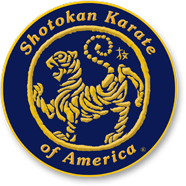“True karate is this: that in daily life one’s mind and body be trained and developed in a spirit of humility, and that in critical times, one be devoted utterly to the cause of justice.” –Gichin Funakoshi
Karate can also be described as a martial art, or fighting method, involving a variety of techniques, including blocks, strikes, evasions, throws, and joint manipulations. Karate practice is divided into three aspects: kihon (basics), kata (forms), and kumite (sparring).
The word karate is a combination of two Japanese characters: kara, meaning empty, and te, meaning hand; thus, karate means “empty hand.” Adding the suffix “-do” (pronounced “doe”), meaning “way,” i.e., karate-do, implies karate as a total way of life that goes well beyond the self-defense applications. In traditional karate-do, we always keep in mind that the true opponent is oneself.
Shotokan founder Gichin Funakoshi has said that “mind and technique become one in true karate.” We strive to make our physical techniques pure expressions of our mind’s intention, and to improve our mind’s focus by understanding the essence of the physical techniques. By polishing our karate practice we are polishing our own spirit or our own mentality. For example, eliminating weak and indecisive movements in our karate helps to eliminate weakness and indecision in our minds–and vice versa.
It is in this sense that karate becomes a way of life, as we try to become very strong but happy and peaceful people. As Tsutomu Ohshima, founder of Shotokan Karate of America, has put it, “We must be strong enough to express our true minds to any opponent, anytime, in any circumstance. We must be calm enough to express ourselves humbly.”
